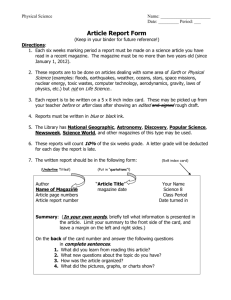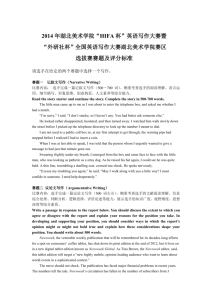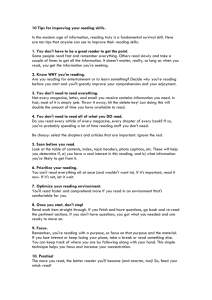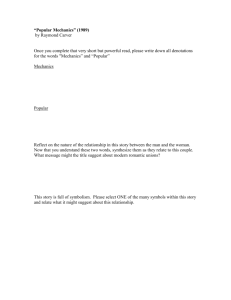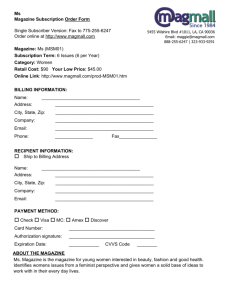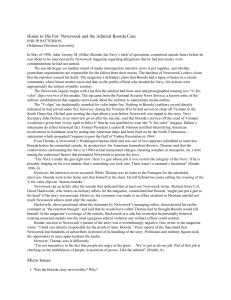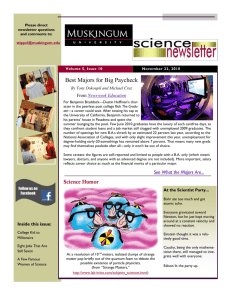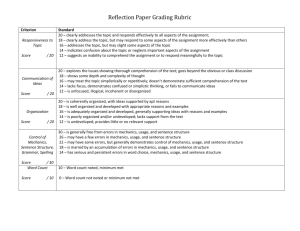Six of the greatest
advertisement
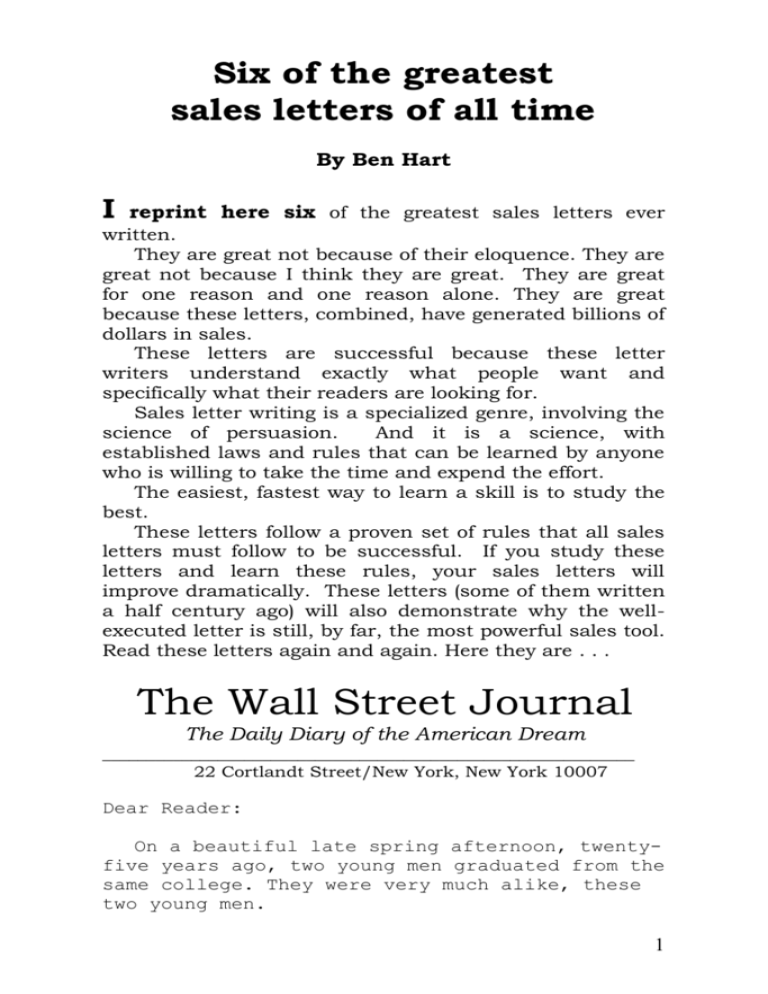
Six of the greatest sales letters of all time By Ben Hart I reprint here six of the greatest sales letters ever written. They are great not because of their eloquence. They are great not because I think they are great. They are great for one reason and one reason alone. They are great because these letters, combined, have generated billions of dollars in sales. These letters are successful because these letter writers understand exactly what people want and specifically what their readers are looking for. Sales letter writing is a specialized genre, involving the science of persuasion. And it is a science, with established laws and rules that can be learned by anyone who is willing to take the time and expend the effort. The easiest, fastest way to learn a skill is to study the best. These letters follow a proven set of rules that all sales letters must follow to be successful. If you study these letters and learn these rules, your sales letters will improve dramatically. These letters (some of them written a half century ago) will also demonstrate why the wellexecuted letter is still, by far, the most powerful sales tool. Read these letters again and again. Here they are . . . The Wall Street Journal The Daily Diary of the American Dream ____________________________________________________________ 22 Cortlandt Street/New York, New York 10007 Dear Reader: On a beautiful late spring afternoon, twentyfive years ago, two young men graduated from the same college. They were very much alike, these two young men. 1 Both had been better than average students, both were personable and both -– as young college graduates are -- were filled with ambitious dreams for the future. Recently, these men returned to their college for their 25th reunion. They were still very much alike. Both were happily married. Both had three children. And both, it turned out, had gone to work for the same Midwestern manufacturing company after graduation, and were still there. But there was a difference. One of the men was manager of a small department of that company. The other was its president. What Made The Difference Have you ever wondered, as I have, what makes this kind of difference in people’s lives? It isn’t always a native intelligence or talent or dedication. It isn’t that one person wants success and the other doesn’t. The difference lies in what each person knows and how he or she makes use of that knowledge. And that is why I am writing to you and to people like you about The Wall Street Journal. For that is the whole purpose of The Journal: To give its readers knowledge – knowledge that they can use in business. A Publication Unlike Any Other You see, The Wall Street Journal is a unique publication. It’s the country’s only national business daily. Each business day, it is put together by the world’s largest staff for business-news experts. Each business day, The Journal’s pages include a broad range of information of 2 interest and significance to business-minded people, no matter where it comes from. Not just stocks and finance, but anything and everything in the whole, fast-moving world of business ... The Wall Street Journal gives you all the business news you need — when you need it. Knowledge Is Power Right now, I am reading page one of The Journal. It combines all the important news of the day with in-depth feature reporting. Every phase of business news is covered, from articles on inflation, wholesale prices, car prices, tax incentives for industries to major developments in Washington, and elsewhere. And there is page after page inside The Journal filled with fascinating and significant information that’s useful to you. A daily column on personal money management helps you become a smarter saver, better investor, wiser spender. There are weekly columns on small business, marketing, real estate, technology, regional developments. If you have never read The Wall Street Journal, you cannot imagine how useful it can be to you. Much Journal printed States, day. of the information that appears in The appears nowhere else. The Journal is in numerous plants across the United so that you get it early each business A $28 Subscription Put our statements to the proof by subscribing for the next 13 weeks for just $28. This is the shortest subscription term we offer – and a perfect way to get acquainted with The Journal. Or you may prefer to take advantage of a longer-term subscription for greater savings: 3 an annual subscription at $107 saves you $20 off The Journal’s cover price. Our best buy -— two years for $185 - saves you a full $69! Simply fill out the endorsed order card and mail it in the postage-paid envelope provided. And here’s The Journal guarantee: Should The Journal not measure up to your expectations, you may cancel this trial arrangement at any point and receive a refund for the undelivered portion of your subscription. If you feel as we do that this is a fair and reasonable proposition, then you will want to find out without delay if The Wall Street Journal can do for you what it is doing for millions of readers. So please mail the enclosed order card now, and we will start serving you immediately. About those two college classmates, I mention at the beginning of this letter. They graduated from college together and together got started in the business world. So what made their lives in business different? Knowledge. Useful knowledge. And its application. An Investment In Success I cannot promise you that success will be instantly yours if you start reading The Wall Street Journal. But I can guarantee that you will find The Journal always interesting, always reliable, and always useful. Sincerely Yours, Peter R. Kann Executive Vice President/ Associate Publisher 4 PRK:vb Enc: P.S. It’s important to note that The Journal’s subscription price may be tax-deductible. This is the legendary “two young men” letter that The Wall Street Journal used for decades to build its circulation. You’ve probably received many versions of this in your mailbox over the years. The letter makes its point by starting with a brief, but compelling story about the fortunes of two young men who have similar educations and backgrounds. Interestingly, the letter does not claim that the more successful young man was a reader of the Journal. But the story is an attention-getter. A brief, compelling story that illustrates your point is one of the most powerful sales techniques because you are telling by showing. Aesop’s fables are far more powerful than simply telling a child the rules of morality. Jesus taught by using parables. He knew that a story would have far more impact on His audience than simply telling us how to act and how to think. In fact, almost the entire Bible is stories. Yes, we’re also given the Ten Commandments, the Sermon on the Mount and Paul’s Epistles─in case we missed the point of the stories. But more than 90 percent of the Bible is stories. Most of us can’t recite all Ten Commandments. But we all remember the stories. The Bible is the best selling book of all time. So stories clearly work. Can you think of ways to use brief but compelling stories to strengthen your sales letters and presentations? Notice, also, that This Wall Street Journal letter includes a strong offer and a guarantee─mandatory features of every successful sales letter. Study the “two young men” letter carefully. Your sales letters will improve significantly and immediately. **** 5 Now examine closely each and every sentence of this amazing letter Newsweek used for decades to build its circulation. In each case, ask yourself, what is the purpose of this sentence? Why did the writer choose this word? Because every sentence and every word in this letter has a definite purpose. This is a truly brilliantly constructed sales letter. Newsweek 117 East Third Street Dayton, Ohio 45402 Dear Reader: If the list upon which I found your name is any indication, this is not the first -- nor will it be the last -- subscription letter you receive. Quite frankly, your education and income set you apart from the general population and make you a highly rated prospect for everything from magazines to mutual funds. You’ve undoubtedly “heard everything” by now in the way of promises and premiums. I won’t try to top any of them. Nor will I insult your intelligence. If you subscribe to Newsweek, you won’t get rich quick. You won’t bowl over friends and business associates with clever remarks and sage comments after your first copy of Newsweek arrives. (Your conversation will benefit from a better understanding of the events and forces of our era, but that’s all. Wit and wisdom are gifts no magazine can bestow.) And should you attain further professional or business success during the term of your subscription, you’ll have your own native ability and good luck to thank for it -- not Newsweek. 6 What, then, can Newsweek do for you? The answer depends upon what type of person you happen to be. If you are not curious about what’s going on outside your own immediate daily range of concern ... if you are quickly bored when the topic of conversation shifts from your house, your car, your ambitions ... if you couldn’t care less about what’s happening in Washington or Wall Street, in London or Moscow ... then forget Newsweek. It can’t do a thing for you. If, on the other hand, you are the kind of individual who would like to keep up with national and international affairs, space and nuclear science, the arts -– but cannot spend hours at it ... if you’re genuinely interested in what’s going on with other members of the human race ... if you recognize the big stake you have in decisions made in Washington and Wall Street, in London and in Moscow ... then Newsweek may well be the smartest small investment you could make for the weeks ahead. For just 11 cents a week, as a Newsweek subscriber, your interest in national and international affairs will be served by over 200 top-notch reporters here and around the world. Each week, you’ll read the most significant facts taken from their daily dispatches by Newsweek’s editors. You’ll get the facts. No bias. No slanting. We respect your right to form your own opinion. In the eventful political arena, in weeks to come, you’ll read about ... 7 JOHNSON - How will government spending for the Great Society programs affect the nation’s economy? FOREIGN POLICY - What settlement is possible in Vietnam? What role for the Buddhists, the army, the Viet Cong? THE ISSUES - Our stance toward Red China. Domestic crises in civil rights, in education, the war on poverty! What solutions are best? You’ll stay abreast of events on the world scene as the Kremlin bosses cope with unrest in the satellite nations and with Peking’s bid to dominate Red affairs ... as Western Europe develops new economic ties and increasingly competes in world markets ... and as chaos and unrest seethe up in Africa and Southeast Asia. You’ll also keep on top of latest developments in the exciting fields of space and nuclear science. Whether the story describes a manned space probe of the Moon or the opening of a new chapter in peaceful uses of atomic fission, you’ll learn the key facts - in plain English -- from Newsweek’s regular department of Science and Space. The fascinating world of art will be reviewed and previewed for you in Newsweek. Whether you’re interested in books or ballet, painting or plays, movies or music -- or all of them -you will find it covered fully and fairly in Newsweek. Subscribe now and you’ll read about International film awards ... controversial art shows at New York’s Museum of Modern Art or the great 8 galleries of Europe ... triumphant concert tours by famed virtuosos ... glittering first nights on and off Broadway ... plus revealing interviews with colorful personalities -- authors, prima donnas, actors, musicians. AND you’ll be briefed on happenings in the worlds of business and finance (What’s ahead now for steel output, auto sales? How will the market react?) ... Education and Religion (More “machine” teaching? Closer interfaith cooperation?) ... Science and Medicine (New breakthroughs in cancer and arthritis research?) ... Sports and TV-Radio (New higher standards, less violence in both?) TRY Newsweek. Try it now at this special introductory rate: 27 WEEKS OF NEWSWEEK FOR ONLY $2.97 That’s just 11 cents a week -- a little more than a penny-and-a-half a day! And try it with this guarantee: if, after examining several issues in your own home, you do not agree that Newsweek satisfies your news interests, you’ll receive a prompt refund on unmailed copies. An order form is enclosed, along with a postage-paid return envelope. Do initial and return the order form today. We’ll bill you later if you wish. Sincerely, S. Arthur Dembner Circulation Director 9 I’m almost certain (though not 100%) that this letter was written by the great copywriter Ed McLean, who wrote many of Newsweek’s sales letters. For decades, this letter powered the explosive growth of Newsweek’s circulation, making Newsweek a serious competitor to Time. Here are four elements that make this letter great: 1) Straight-forward honesty The letter begins by telling the reader what Newsweek is not, and what Newsweek won’t do for the reader. This is the classic “start-with-a-damaging-admission” strategy. This builds credibility for the rest of the letter. Newsweek won’t make you rich, won’t help you advance your career, and won’t impress your friends. The letter then goes into all the interesting topics and issues covered by the magazine. But the letter would not have been nearly as strong if it had started with this catalogue of what you’ll find in the magazine. Starting with a damaging admission not only builds credibility for the rest of the letter in the mind of the reader, it’s also just more interesting to read about weaknesses than strengths. No one wants to listen to a braggart. But ears will perk up if you begin by clearly describing what you cannot do. In addition, starting a letter by listing weaknesses is one of the best ways to instantly communicate your U.S.P.─your Unique Selling Proposition. 2) Casual, conversational, engaging style This letter sounds a lot like someone having a casual conversation with the reader. It’s breezy, filled with interesting details and provocative questions. There’s nothing pedantic in this letter. A fourth grader could easily read and understand it. 3) Understated formatting This letter contains none of the screaming headlines that we see in most direct mail solicitations. This helps 10 reinforce the letter’s credibility. It just doesn’t look like all the other junk mail we receive. It looks like a real letter, even though it’s not personalized (to save on cost). But the writer does use a number of understated formatting tricks to catch the reader’s eye. You’ll see some ellipses as well as some unusual indents. Some paragraphs are indented; while others are not. Indeed, some of the formatting almost looks like it was a mistake, which is eye-catching in itself─but you can be certain it was all intentional, aimed at catching the reader’s eye and making the letter easily scannable. 4) Strong offer For a penny-and-a-half a day, you can try Newsweek. And if you don’t like the magazine, you can receive a full refund for any unmailed copies. Nothing very unusual here. This is the type of offer you’ll see in many successful direct mail sales letters. But the casual way in which the letter communicates the offer and the guarantee also helps establish credibility. The letter uses no intelligence-insulting “hype” words such as “greatest” or “best ever” that you see in so many sales pitches. Just the facts. Here’s the offer─“take it or leave it” is the impression the letter leaves with the reader. We’d love to have you as a subscriber, but we’re not desperate either. And we’re certainly not going to sell you hard by overstating what we are. What I’m describing is exactly what you’ll get. Wouldn’t it be great if every advertiser took this approach? We might then actually pay attention to the ads. Every sales letter and advertising copywriter would do well simply by imitating the approach of this letter. **** Here’s another terrific letter, this one from Popular Mechanics─the language and tone calibrated perfectly for the rugged, roll-up-your sleeves, jack-of-all-trades, handyman-type fellow this letter is trying to reach. 11 Popular Mechanics 250 WEST 55TH STREET, NEW YORK, N.Y. 10019 ************************************* If you want to live better ... Don’t mind hard work ... Like to pay your own way ... Let me ship you VOL. I of the exciting POPULAR MECHANICS DOIT-YOURSELF ENCYCLOPEDIA. And I want you to keep it. FREE! ************************************* Good Friend, This invitation isn’t for deadbeats, rip-off artists or “gentlemen” who hate to get their hands dirty. It’s for the rest of us. It’s for the average guy who works hard for a living (and wants to live better). Who knows the value of a buck (about 50 cents these days.) Who is willing to trade a few drops of sweat for the chance to save big bucks. It’s for guys who aren’t afraid to get down under the sink with a pipe wrench. Guys who don’t mind sticking their hands in the toilet tank to adjust a ball cock (because they know it’s going to save a $16 plumber’s bill). Our country was built on the sweat and hard work of do-ityourself guys. And from POPULAR MECHANICS, the #1 do-it-yourself 12 magazine, we’d just like to say THANK YOU. Our big, illustrated POPULAR MECHANICS DO-ITYOURSELF ENCYCLOPEDIA was written with “shirtsleeves” guys in mind. Guys like you. So please -– let me ship you Volume I FREE. (No strings attached. No purchase necessary.) It’s BIG –- 168 oversized pages crammed with up-to-date money-saving plans, photos, diagrams and articles about how-to-do-just about EVERYTHING! From fixing your car’s alternator to improving your gas mileage by 30 percent! From drilling an angled hole accurately, to resurfacing your asphalt driveway or fixing a small appliance. It’s PRACTICAL -– oversized pages lay down flat so you have them right there on your shop table or car fender to refer to. Sturdy hardcovers laugh at dirt! Type is LARGE so it’s easy-to-read. Each article is generously illustrated – Volume I alone has more then 600 step-by-step drawings, photos and diagrams. SPEAKING OF SAVING, HAVE YOU SEEN TO A BODY SHOP LATELY? If it was within the past 12 months, you know the cost of auto body repairs has zoomed out of sight! So we got the manger of a big body shop near our office to share his trade secrets with us. The results? An article illustrated with howto-do-it photos that shows you how to get rid of scratches, dents, rust and rotten spots yourself -– make your fender look like new! 13 All this, and much more, is in Volume I of the POPULAR MECHANICS DO-IT-YOURSELF ENCYCLOPEDIA. But remember -– you don’t pay a cent for it. Now or ever. And there’s no obligation -– NO PURCHASES NECESSARY! “Well, come on,” you’re probably saying, “There’s gotta be a catch.” MAYBE THERE IS. Sure, I’d like to sell you the whole POPULAR MECHANICS DO-IT-YOURSELF ENCYCLOPEDIA. But I know from experience that I can’t “sell” someone like you. You’ve got to prove for yourself it’s worthwhile. So accept our FREE book and examine Volume I, then make up your own mind. VOLUME I IS YOUR FREE SAMPLE. AND I WANT YOU TO USE IT FOR ALL IT’S WORTH. Got kids? Turn to page 50 for complete plans and instructions for making your own hockey tabletop game. (You’ll have a ball with it too.) It would cost you plenty in a store. But you can make it with a few dollars worth of lumber, particleboard, and an old range exhaust fan. Want a greenhouse? On pages 30-32 you’ll find plans for an elegant addition -– an add-on Greenhouse. How about valuable antiques? Why not build your own authentic reproduction pine and maple bench ... for a fraction of what an original would cost. Complete plans and instructions start on Page 30. 14 Turn to page 178 to see how easy it is to do all your own routine auto service and maintenance. (If you’re spending $200 a year to have a pro do it, you could save $150!) Cool your house in the summer (and cut your air conditioning electric bills) by installing an attic fan. The article starting on page 156 shows you how. I could go on and on. But why should I? Volume I of POPULAR MECHANICS DO-IT-YOURSELF ENCYCLOPEDIA is yours for the asking. You don’t even pay to send for it. Postage paid Reply Card enclosed. So what are you waiting for? Say YES today! When your “Free sample” arrives, keep it. And use it. And see for yourself why POPULAR MECHANICS is usually considered the world’s leading source of “do-it-yourself” information. NOW LISTEN TO THIS. If Volume I isn’t everything I’ve promised, just drop us a note saying “No more!” That will be the end of it (of course, you keep Volume I). But if you are pleased as I expect, just sit back and enjoy your Free Volume. Then, eight weeks later, you’ll receive Volume II of the POPULAR MECHANICS DO-IT-YOURSELF ENCYCLOPEDIA -– Just as big, beautiful, husky and crammed with plans and information as the first one. For example: HOW TO TEST & RECHARGE MOST BATTERIES ...BUILD YOUR OWN BARBECUE BAR ... FINISH YOUR BASEMENT LIKE A PRO ... PUT IN A STAIRWELL ... INSTALL A HALFBATH ANYWHERE. PLUS EVERYTHING YOU OUGHT TO KNOW ABOUT HANDSAWS ... HOW 15 TO REMOVE A BEARING WALL ... ALL ABOUT BELT SANDERS ... CHOOSING THE RIGHT BIKE ... AND MUCH, MUCH MORE! That’s just a sample of Volume II. But remember -- YOU HAVEN’T YET SPENT OR RISKED A PENNY: Because Volume II is yours to examine and use freely for 14 days: Then, if you are not completely “sold” on the POPULAR MECHANICS DOIT-YOURSELF ENCYCLOPEDIA, just return it before the Free-Examination Period is over, and owe nothing. By now, however, if you’re the kind of guy I think you are, you should be itching to get your hands on the remaining 18 volumes of the POPULAR MECHANICS DO-IT-YOURSELF ENCYCLOPEDIA. If so, when Volume II arrives, simply remit the low subscriber price of only $5.95 plus a small charge for shipping & handling and any applicable sales tax. Then, the remaining volumes will be sent to you over a five-month period -– each shipment strictly “on approval.” Pay for each volume (one payment a month) at the low subscriber price of only $5.95 -– or return it within the 14-day Free-Examination Period and owe nothing. BUY AS FEW OR AS MANY VOLUMES AS YOU WISH. CANCEL ANY TIME! Remember -– Volume I of the POPULAR MECHANICS DO-IT-YOURSELF ENCYCLOPEDIA is your “Free Sample” -– yours to keep even if you decide not to buy anything. But to get it, you have to sign and mail the enclosed Reply Card. Do it today. Cordially, 16 J. Michael Walters For POPULAR MECHANICS P.S. If you take pride in work well done, want to give your family the better things in life ... then you need POPULAR MECHANICS how-to-do-it information on AIR CONDITIONERS ... BARBECUES ... BOATS ... BIRDHOUSES ... BOOKCASES ... BURGLAR ALARMS ... CAULKING ... CAMERAS ... CONCRETE ... CLOCKS ... DOORS... DRILL PRESSES ... ENGINES ... FAUCETS ...FENCES ... GUNS ... GETTING IN SHAPE ... HEATERS ... INSULATION ... KITCHENS ... KITS ... LANDSCAPING ... METALWORKING ... OUTBOARDS ... PAINTING ... PLUMBING ... PLYWOOD ... REMODELING ... ROOFS ... RAIN GUTTERS ... SEPTIC TANKS ... SEWING CENTERS ... SKIN DIVING ...SOLAR ENERGY ... SWIMMING POOLS ... TILE ... TOOLS ... TOYS ... TRAILERS ... TREES ... UPHOLSTERY ... VACATION HOMES ... VACUUMS ... WINDOWS ... WOODWORKING. These are just a few of the subjects covered in the 20-volume POPULAR MECHANICS DO-ITYOURSELF ENCYCLOPEDIA. And Volume I is yours to keep -- but only if you mail the Reply Card NOW! Our Promise When Popular Mechanics says free, it really means free. Unlike some of those book and record club deals that promise something special at the beginning, and then commit you to expensive purchases later on in the fine print, this free offer does not obligate you in any way. This is not a book club. You’ll receive your free book with no obligation -- ever -- to accept anything else. This might be my favorite letter of the six I’m reprinting for you here. It’s anti-establishment, has a slightly angry, 17 us-against-the-world tone. And is clearly written for guys who like to fix and build things themselves, guys who get a giddy, tingly feeling when they have a hammer or power saw in their hand. If you understand your reader, you are 90 percent of the way to writing an effective sales letter. I can’t imagine many women answering this letter, except maybe on behalf of her husband if he’s the roll-up-his-sleeves and get-his-hands-dirty handyman type. This is actually more of a lead-generation letter. Popular Mechanics is willing to invest a significant sum of money to find its buyers─giving away an expensivelyproduced free book and backing-up the offer with an attention-getting guarantee. If you are a do-it-yourselfguy, I can’t imagine turning down this impressive offer. Clearly, Popular Mechanics is convinced of the value of this product, as it’s counting on the strength of the free sample to sell the rest of the encyclopedia set and to create loyal customers for its magazine and vast array of do-it-yourself books and manuals. Popular Mechanics knows the average long-term value of a customer, and therefore how much it can afford to invest to acquire a new customer. Note also the double use of the “Johnson Box”─at the start, and then again at the close of the letter─which summarizes the offer and restates the impressive guarantee. **** American Express Dear Mr. Masterson: Quite frankly, the American Express Card is not for everyone. And not everyone who applies for Card membership is approved. However, because we believe you will benefit from Card Membership, I’ve enclosed a special invitation for you to apply for the most honored 18 and prestigious financial instrument available to people who travel, vacation, and entertain. The American Express Card is the perfect example of the old adage, “You get what you pay for.” For example, you get a truly impressive array of extra privileges, all designed for your convenience and security: A Worldwide Network of Travel Service Offices* is at your Service. Enjoy personal attention at any of the nearby 1,000 American Express Offices -- Your “homes away from home” -- around the globe. Cash your Personal Check at Thousands of Locations. Cash up to $250 at participating hotels and motels, and up to $1,000 at most American Express Travel Services Offices all over the world. (Subject to cash availability and local regulations.) Card Lost or Stolen? You’ll Get a Quick Replacement. If the Card is lost or stolen, an emergency replacement will be provided at any Travel Service Office in the world, usually by the end of the next business day. Obtain Emergency Funds Instantly. Once you’ve enrolled in this convenient service, our network of automated Travelers Cheque Dispensers lets you obtain up to $500 ... in 60 seconds or less! Carry $100,000 of Travel Accident Insurance. Just charge your tickets to the Card, and you, your spouse or dependent children under the age of 23 19 are automatically covered when traveling by common carrier on land, sea, or in the air. It’s underwritten by Fireman’s Fund Insurance Companies, San Rafael, California, for approximately 35 cents of the annual Card Membership fee. Your Hotel Reservations are Assured. As an American Express Card Member, if you request, your hotel room will be held for you until checkout the following day at nearly 8,000 participating hotels. Enjoy Special Express Hotel Service. Speedy check-in and checkout is available to Card Members at more than 1,000 hotels, including Hilton, Hyatt, Marriott, Sheraton, and more. Extras like these only begin to tell the story of American Express Card security, emergency protection, and convenience. You’ll also enjoy: 20 Unequalled Mobility. The Card is welcomed by the world’s major airlines, car rental agencies, railroads, and cruise lines. Plus it pays for auto parts and servicing at thousands of locations nationwide. A Worldwide Welcome. Fine restaurants, hotel resorts, and a host of other establishments around this world, and right in your hometown, recognize the Card and welcome your patronage. Purchasing Power. No need to carry large amounts of cash. The Card takes care of shopping needs, whether you’re choosing a wardrobe, buying theater tickets, sending flowers, or hosting a dinner (even if you can’t be there!) Financial Freedom. Unlike bank cards, the American Express Card imposes no pre-set spending limit. Purchases are approved based on your ability to pay as demonstrated by your past spending, payment patterns, and personal resources. So you are free to make your own decisions about when and where to use the Card. In a few words, American Express Card Membership is the most effective letter of introduction to the world of travel, entertainment, and the good life yet devised. Yet surprisingly, these benefits are all yours to enjoy for the modest fee of just $35 a year. Why not apply for Card Membership today? All you have to do is fill out and mail the enclosed application. As soon as it is approved, we’ll send along the Card, without delay. Sincerely, Diane Shalb Vice President P.S. Apply today, and enjoy all the benefits of Card Membership. Those listed here are just a handful of what’s available. A full listing is included in the Guide to Card Member Services you’ll receive along with the Card. This is the offer that built American Express. You’ve probably received one (or many) of these letters. The letter relies on one of the most powerful human desires─the desire for status. People want to be members of an exclusive club. Possession of the card tells those who see it that you’ve made it in life, that you’re successful, that you are good enough to be in this exclusive club. This card shows the 21 world that you are a cut above most. At least, that’s what American Express wants us to believe. Plus, American Express delivers a menu of attractive benefits and conveniences, mostly aimed at appealing to the desire many have to be pampered. “Privileges” is the word the letter uses. In addition, the letter taps into our fears and anxieties by promising to be there for us in times of emergency. Notice also that this letter is personalized─essential if your offer relies on an argument built around the honor of receiving such an invitation. This letter is a superb example of how a short letter can pack a powerful punch. In this case, gilding the lily with a long letter would undermine the prestige of the invitation. The tone of the letter is arrogant and elitist. “We don’t need to sell you,” the letter implies. “You should feel honored by this invitation.” This letter is really more of an announcement than an invitation. The tone suggests there’s no possibility that any right-thinking person would refuse to join if invited. In fact, this letter is really just an invitation to apply for membership. We’re supposed to feel honored to be invited just to apply. This is an offer built on snob appeal and the desire for status. Think about how you might make an offer along these lines to your very best clients and customers─your VIP list? Everyone wants to be treated like a VIP. **** Prevention Emmaus, PA 18099 Dear Reader: My Grandmother lived with us when I was growing up. She used to give me chamomile tea when my stomach was upset. She insisted that the family use vinegar to rinse hair and made a cucumber 22 cleanser for my face. As I grew older, I decided Grandmother was hopelessly out of date. Then a few years ago, I began remembering how it was when I lived with her. How shiny and healthy our hair had always been. How beautiful my skin remained throughout adolescence. How full of energy and vitality all of us were without our soft drinks, candies and snack foods (she wouldn’t allow them in the house -– “empty foods,” she’d snort ... and hand me a box of raisins or dried apricots). I was reminded of grandmother when I noticed how often the government removed a chemical from the market after everyone had been eating it for years. I began wondering whether the products I was using today would be forbidden tomorrow. And that started me thinking about how many chemicals I used and ate. Almost everything contains chemicals! I kept reading how scientists thought some of them caused serious medical problems. How simple things like headache remedies could create other troubles. I was stunned by the number of foods that were almost completely “fake” -- most of the good things had been taken out and chemical substitutes put in. You read about threats and dangers to your health like these everyday in almost every newspaper and magazine you open. But I know of only one publication that tells you -– sincerely and consistently -– how you may combat these problems ... what you may do to try to live healthier in this often unhealthy world of ours: PREVENTION magazine. If you’ve ever seen PREVENTION, you know its style. Understandable. Practical. Down-to-Earth. It’s the magazine that over two million Americans regularly turn to for the help and 23 advice that they cannot find from any other source -– sometimes doctors included. If you haven’t seen the magazine ... I’d like to send you the latest issue so you can take a good look. I’m sure you’ll find its “feel better” ideas as stimulating as a breath of fresh air. To get your no-risk, no obligation copy of PREVENTION magazine ... 1. Just mail the enclosed postpaid card. BUT SPEND NO MONEY NOW. 2. We’ll send you PREVENTION and enter a trial no-risk 12-month subscription in your name. 3. If you like what you see and want to subscribe to PREVENTION magazine’s unique brand of “feed better” advice, simply pay the $8.99 invoice. If not, just mark “cancel” on our bill, return it and owe nothing. You keep the first issue free of charge. Now, that’s a fair offer, isn’t it? And we’re making it so easy because we want you to take just one look -- so you can see just how valuable PREVENTION magazine may be in your life. Why so valuable? Because PREVENTION is the cheapest, most easily accessible source that you have to much of the latest medical research findings ... to some of the alternative ways to try to “get better” and “stay better” without resorting to drugs and surgery ... to the basic, earthy, natural approach to better living that my 24 Grandmother (and perhaps, yours, too) knew almost intuitively. WHY DO YOU NEED PREVENTION? It’s an honest question. And, basically, the answer is three-fold: 1. PREVENTION tries to help you even out the increasing odds against your better health. Open any newspaper or magazine and you’re likely to read about another chemical in your environment ... another additive in your food ... another way that may shorten your life span; another way perhaps leading to diseases like cancer or heart trouble. It’s getting so depressing that many people block it out of their minds. They “grow accustomed” to the new dangers. They try to pretend they don’t exist. But that doesn’t make these potential dangers disappear; it doesn’t make life any healthier, longer ... or even happier. PREVENTION tries to alert you to the dangers, too. But we can’t stop them. Every issue tells you what you may do to try to avoid them ... possibly correct them ... and, in some cases, even perhaps repair some of the damage that they may have already done. 2. PREVENTION tells you more than your doctor perhaps can or will. Today, surgery and drugs are not the only “get better” alternatives available to you. There are other options open. Options that, often, are safer, cheaper, gentler than those of “traditional medicine.” Time after time, we’ve found that a number of today’s physicians may 25 not even be aware of these alternatives. So how can you expect to know of them? PREVENTION tries to be your link. You learn about how your body functions ... what it needs for better well-being ... how you may, many times, correct a minor illness or ailment yourself. PREVENTION may help you be a more intelligent, more aware medical consumer. (After all, your health is your responsibility.) 3. PREVENTION seems to work well. The PREVENTION System for Better Health apparently gets results. If it did not, we would most certainly not be the number one health magazine in the world today -– which we are –- with over two million regular subscribers. We make no miracle claims; offer no instant result. All we say is if you truly want better health ... ... if you want to try to live a longer, more active life ... if you want to treat what may be the source -– not symptoms alone -– of your health problems ... if you want to know more about what you may do to live healthier in this unhealthy world of ours ... ... PREVENTION may show you -– step by step –- the things that you may do to help achieve these desires. Isn’t it worth a free look? And if PREVENTION works for you, isn’t it well worth the $6.99 subscription price? We think so. Over two million monthly readers think so. But what do you think? Look first (at our risk) and then decide. Here’s how ... 26 REMEMBER OUR NO-RISK OFFER: LOOK NOW, DECIDE TO SUBSCRIBE LATER. Of course, I could go on and on about PREVENTION. Sharing with you the many ways the PREVENTION System has helped me personally ... telling you about specific natural healing techniques ... quoting some moving testimony from PREVENTION readers ... ... but I’ll spare your time. One free look is worth a thousand words of advertising. And PREVENTION speaks for itself –POWERFULLY. So you be the judge. Just mail the enclosed card to inspect PREVENTION –- the modern “get better, feel better,” natural health system whose roots go very deep indeed. I’m on the PREVENTION System. And I’ve got to tell you, I feel better –- and look better -– because of it. It has helped me. It may help you too. I hope you try PREVENTION. I hope everybody does. We need a little more “real” in our lives and a few less substitutes. Sincerely, Sandy Gibb P.S. ACT NOW AND GET A FREE BOOK ABOUT THE PREVENTION SYSTEM! For all those who mail the enclosed card ... ... We have a free bonus: a copy of the PREVENTION SYSTEM FOR BETTER HEALTH -– the book that explains in plain language how this natural health method works. Here are 27 the basics of the 35-year-old system that has helped improve the well-being of so many over the years. You can’t buy a copy of this remarkable book anywhere. But it’s yours free -– whether you subscribe to the magazine or not -– so take action now, while you’re thinking about it. P.P.S. AN EXTRA FREE BOOKLET ... AND ADDED SAVINGS! If you’re planning to give PREVENTION a try, why not try 24-months? There are plenty of good reasons why you should. 1. THERE’S NO EXTRA RISK. Our money-back on unmailed copies privilege assures it. 2. GUARD AGAINST PRICE INCREASES. They’re almost inevitable with our present economy. Buying a 24-month subscription could be an insurance policy against highest pries. 3. GET THIS BOOK AS A BONUS. In addition to your free copy of THE PREVENTION SYSTEM FOR BETTER HEALTH, we’ll send you a copy of our HERBS FOR HEALTH when you subscribe for 24 months. Now you can get acquainted with one of the alternatives to drugs and medications: the healing herbs. Here are the “medicines of yesterday” that are making a comeback. You’ll find herbal treatments and folk “remedies” for dozens of common ailments. And you’ll learn to know and use 70 wonderful plants and herbs in HERBS FOR HEALTH. You can’t buy it anywhere, but it’s yours free from PREVENTION with this trial subscription. Here’s another letter that begins with a story─this one about the letter-signer’s grandmother. The letter uses 28 nostalgia─a desire to return to simpler and perhaps happier times of old─as a way to put us into a buying frame of mind. And the letter taps into the most powerful motive driving people to buy─fear. In this case, fear of all the chemicals (poisons) companies put into our foods, in addition to all the healthy ingredients companies strip out of our foods. And this letter makes a strong argument for many of the old-time remedies that worked so well for many ailments and illnesses─remedies our grandmothers knew, but that have been forgotten by modern medicine, but also which are coming back into vogue because they are effective. Similar to the Popular Mechanics and Newsweek letters reprinted earlier, this letter is folksy, conversational and very easy to read. You’ll see the kinds of grammatical errors you hear in regular face-to-face conversations. The writer is perfectly capable of using proper grammar that would pass muster in a college writing course, but chooses not to in order to capture the casual style of someone sitting across your kitchen table having a conversation. More rigorous use of correct grammar would be important for another audience─perhaps when writing to college-educated corporate executives or to English professors─but not here. The writer is not trying to impress a college English professor. This writer is talking to average folks who are worried about their health and who suspect there’s something wrong with many of the processed foods we buy at the grocery store. Prevention’s two million subscribers attest to the success of this approach. Notice also that the P.S. is packed with special bonuses. Books and special reports that can’t be found anywhere else, and that are exactly in line with the subject of the main product offered, are proven response-boosting devices. Many readers will make the decision to subscribe to the magazine just to get the valuable bonuses. **** I love the understated tone of this famous sales letter for the Kiplinger Washington Letter, the best selling financial advice newsletter of all time. 29 The Kiplinger Washington Editors, Inc. 1729 H Street, Northwest, Washington, D.C. 2006 Telephone: 202.887.6400 More Growth and Inflation Ahead . . . and what you can do about it. The next few years will see business climb to the highest level this country has ever known. And with it . . . inflation. This combination may be hard for you to accept under today’s conditions. But the fact remains that those who do prepare for both inflation AND growth ahead will reap big dividends for their foresight, and avoid the blunders others will make. You’ll get the information you need for this type of planning in the Kiplinger Washington Letter . . . and the enclosed form will bring you the next 26 issues of this helpful service on a “Try-out” basis. The fee: Less than 81 cents per week . . . only $21 for the six months . . . and tax-deductible for business or investment purposes. During the depression, in 1935, the Kiplinger Washington Letter warned of inflation and told what to do about it. Those who heeded its advice were ready when prices began to rise. Again, in January of 1946, the Letter renounced the widely-held view that a severe post-war depression was inevitable. Instead, it predicted shortages, rising wages and prices, a high level of business. And again, those who heeded its advice were able to avoid losses, to cash in on the surging economy of the late ‘40s, early ‘50s and mid-‘60s. It then kept its clients prepared for the swings of the ‘70s, keeping them a step ahead each time. Now Kiplinger not only foresees expansion ahead, but also continuing inflation, and in 30 this weekly Letter to clients, he points out profit opportunities in the future . . . and also dangers. The Kiplinger Letter not only keeps you informed of present trends and developments, but also gives you advance notice on the sort & long-range business outlook . . . inflation forecasts . . . energy predictions . . . housing . . . federal legislative prospects . . . politics . . . investment trends & pointers . . . tax outlook and advice . . . labor, wage settlement prospects . . . upcoming gov’t rules & regulations . . . ANYTHING that will have an effect on your business, your personal finances, your family. To take advantage of this opportunity to try the Letter and benefit from its keen judgments and helpful advice during the fast-changing months ahead . . . fill in and return the form with your $21 payment. And do it with this guarantee: That you may cancel the service and get a prompt refund of the unused part of your payment any time you feel it is not worth far more to you than it costs. I’ll start your service as soon as I hear from you, and you’ll have each weekly issue on your desk every Monday morning thereafter. Sincerely, Stanley Mayes Assistant to the President SAM:kga P.S. More than half of all new subscribers sign up for a full year at $42. In appreciation, we’ll send you FREE five special Kiplinger Reports on receipt of your payment when you take a full year’s service, too. Details are spelled out on 31 the enclosed slip. Same money-back guarantee and tax-deductibility apply. This letter is simple, to-the-point and uses several proven motivators to persuade its readers to buy: fear of inflation and fear of missing important information that may cost the reader money; plus the possibility that the Kiplinger Letter will give the reader a financial edge (greed). Fear is the #1 motivation driving people to buy, but greed is probably #2. Put those two motivations (incentives) together, and you have a powerful selling formula. In addition, the Kiplinger Letter is inexpensive. As such, this offer is difficult to pass up if you are at all interested in your financial well-being (most of us are). This offer would appeal to subscribers to the Wall Street Journal, Forbes magazine and other publications dealing with personal finance. This sales letter also outlines Kiplinger’s impressive track-record, dating back to the 1930s, of giving financial advice that proved to be on target. The Kiplinger Letter is among the most successful and widely circulated financial newsletters ever published. This sales letter is certainly worthy of careful study. If you want to learn golf, copy Tiger Woods. Study what he does. And learn why he does what he does. And then practice. If you want to write great sales letters, study the six great sales letters I’ve reprinted here. And then practice. Whether you are writing to a few people or a million people, if you follow the approach of these six of the greatest sales letters ever written, you are well on your way to near limitless success. 32
